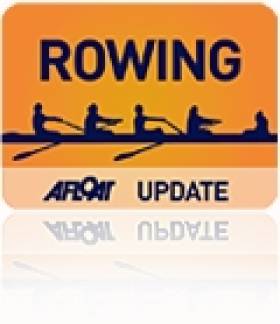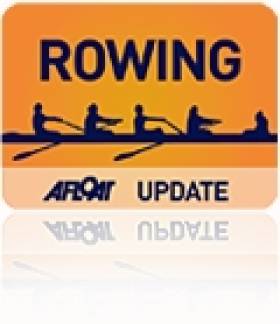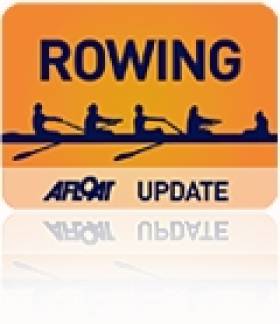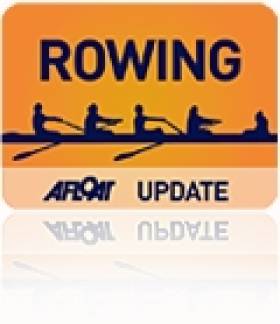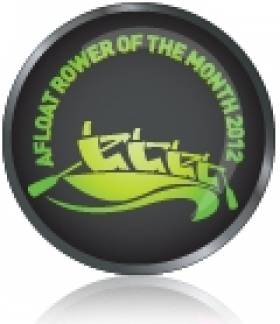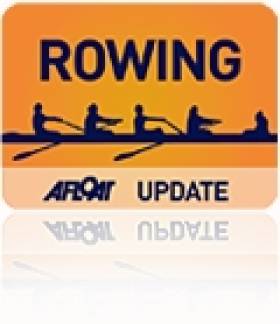Displaying items by tag: Claire Lambe
Lambe and O'Donovans Set New Personal Best Times in Indoor Tests
#Indoor Rowing: Claire Lambe excelled among a group of lightweight rowers who set personal best times in ergometer (rowing machine) tests at the National Rowing Centre in Cork. Gary O’Donovan, Mark O’Donovan and Shane O’Driscoll all set new best times. Paul O’Donovan did his test in Dublin and also broke new ground. Heavyweight rower Aifric Keogh matched her best time of six minutes 55.5 seconds.
High Performance Ergometer Testing, National Rowing Centre, Cork
Men
Lightweight: 1 G O’Donovan 6:13.7, 2 M O’Donovan 6:16.8, 3 S O’Driscoll 6:18.5.
Women
Open: A Keogh 6:55.5, L Kennedy 6:56.7.
Lightweight: C Lambe 7:05.6, S Dolan 7:15.3.
Irish Provinces Indoor Rowing Championships, University of Limerick (Selected Results; 2000 metres unless stated)
Men
Open – 1 R O’Hagan 6:09.4, 2 F Crowley 6:24.9, 3 A Prendergast 6:25.5. 30-39: G Conway 6:19.7. Open 500: R O’Hagan 1:19.6.
Under-23: A Kinneen 6:20.2. Junior 18: R Byrne 6:16.9, 500: E Walls-Tuite 1:22.3.
Jun 16: J Keating 6:33.8, 500: J McCarthy 1:29.8.
Jun 15 (1,000): R MacCurtain 3:23.6.
Freshers (1,000); G Barlow 3:05.2.
40-49: N Carey 6:24.3, 500: Carey 1:23.9. 50-59: O Short 6:46.9, 500: Short 1:29.4. 60-69: P Victory 6:57.6, 500 (60+): P Victory 1:32.6.
Lightweight – Open: D O’Connor 6:33.5, 500: L Keane 1:28.9.
Lightweight Under-23: L Keane 6:25.0, 500: Keane 1:28.9. Lightweight 40-49: J Doyle 6:29.1.
Women
Open – 1 M Dukarska 7:02.7, 2 A O’Sullivan 7:19.0, 3 M Piggott 7:34.7. 500: M Dukarska 1:33.6.
Under-23: S Bounane 7:18.7. Junior 18: M Cremin 7:23.3.
500: M Cremin 1:38.8.
Jun 16: A O’Farrell 7:32.7, 500: L Turner 1:44.1.
Jun 15: (1,000): A Doyle 3:50.6, 500: J Crowley 1:41.1
Freshers (1,000): B Chase 3:43.2.
30-39: S Kennelly 7:24.9. 40-49: P O’Brien 7:51.8, 500: R Ware 1:43.3. 50-59: M Lawlor 8:11.2, 500: Lawlor 1:55.9.
Lightweight – Open: S McCrohan 7:14.7, 500: K Wilkie 1:44.4.
Lightweight Under-23: E McGiff 7:49.2.
Lightweight 30-39: C Conway 7:48.3.
LTA – S McLoughlin 3:51.1, 500: McLoughlin 1:51.0.
Ulster Indoor Rowing Championships, Queen’s University, Saturday (Selected Results, 2,000 metres unless stated). Includes BUCS: British University Championships.
Men
Open: S McKeown 6:04.7, 2 M Christie 6:25.9. BUCS Open: 1 T Oliver 6:10.6, 2 P Doyle 6:26.9, 3 R Urquart 6:34.7. BUCS Lightweight: C Beck 6:31.2.
Under-23 Lightweight: A Laivinas 6:50.3.
Under-18: D Mitchell 6:26.0. Under-16: A Christie 6:39.3. Under-15: A Graham (1,000m) 3:32.7.
BUCS Beginners (1,000): J Lobinger 3:11.4.
Women
Open: R Maguire 7:15.4. BUCS Open: Maguire 7:15.4. BUCS Open Lightweight: R Brown 7:46.7.
Under-23: K Shirlow 7:28.3.
Under-18: F Chestnutt 7:31.0.
Under-16: L McIntyre 7:46.2. Under-15 (1,000m): A Hall 3:54.6. 30+ (1,000m): L Kerr 3:20.9.
BUCS Beginners (1,000m): A Druijff 3:45.8.
Ireland Lightweight Double Pipped for World Rowing Semi-Final Spot
#ROWING: Sweden pushed Ireland out of the vital second spot in the repechage of the lightweight double sculls at the World Rowing Championships in Amsterdam today. The race developed into a three-boat battle to land the two spots in the A/B Semi-Finals: world champions Italy and Ireland, who had a very good third quarter, led early leaders Sweden at 1500 metres. The Swedes came back, however, and pipped Ireland by .51 of a second. Ireland's Claire Lambe and Denise Walsh are now set to compete in the C/D Semi-Finals.
World Rowing Championships, Amsterdam, Day Three (Selected Results; Irish interest)
Women
Lightweight Double Sculls – Repechage Four (First Two to A/B Semi-Finals; rest to C/D Semi-Finals): 1 Italy (L Milani, E Sancassani) 7:40.06, 2 Sweden (C Lilja, E Fredh) 7:43.11, 3 Ireland (C Lambe, D Walsh) 7:43.62, 4 Belarus 7:55.20.
Lambe Pulls Out of World Cup Rowing Regatta
#ROWING: Ireland will be without an entry at the World Cup regatta in Sydney this weekend. Claire Lambe, who was entered in the lightweight single sculls, has pulled out because of injury. The Dubliner has hamstring tendinitis. She has been competing with some success for Melbourne University Boat Club but plans to return home to Ireland as planned in the next two weeks.
Lambe Just One Place From Medal in European Rowing Final
# ROWING: Ireland’s Claire Lambe finished fourth in the A Final of the lightweight single sculls at the European Rowing Championships in Seville this morning.
Raced into a strong headwind this was an interesting contest. At the head of the field Greek tyro Alkaterini Nikolaidou moved up alongside multi-medal winner Michaela Taupe-Traer in the middle stages of the race and then took off at 1500 metres to win gold, with the Austrian having to settle for silver. Lambe was fourth behind Marie-Anne Frenken of the Netherlands all down the course and could not make up the deficit in the final quarter to move into the medal places.
European Championships, Day Three (Irish interest)
Women
Lightweight Single Sculls – A Final: 1 Greece (A Nikolaidou) 8:32.92, 2 Austria (M Taupe-Traer) 8:36.59, 3 Netherlands (M-A Frenken) 8:39.14; 4 Ireland (C Lambe) 8:47.66, 5 Italy 8:50.74, 6 Cyprus 9:01.25.
Fine Start by Ireland at European Rowing Championships
# ROWING: Ireland had a good start at the European Rowing Championships in Seville today. Claire Lambe nailed the second place she needed to qualify directly for the A Final of the lightweight single sculls and Sanita Puspure qualified for her semi-final of the single sculls by taking the third of three qualification places.
Ireland’s two other crews face into repechages later today. Niall Kenny and Justin Ryan took third in a heat of the lightweight double sculls won by Italy, who took the one semi-final place on offer, repelling a challenge by Austria. Ireland won a mini-battle with Bulgaria for third.
John Keohane finished fifth in his heat of the single sculls. Germany’s Marcel Hacker had his expected win, with Mindaugas Griskonis of Lithuania taking the second qualification place. Keohane, who is new to this level, held off Russian Denis Kleshnev, who finished sixth.
European Rowing Championships, Seville – Day One (Irish interest)
Men
Lightweight Double Sculls – Heat Four (One Directly to A/B Semi-Finals; rest to Repechages): 1 Italy (A Micheletti, P Ruta) 6:39.92; 2 Austria 6:44.49, 3 Ireland (N Kenny, J Ryan) 6:47.43, 4 Bulgaria 6:48.89, 5 Czech Republic 6:51.76.
Single Sculls – Heat One (First Two Directly to A/B Semi-Finals; rest to Repechages): 1 Germany (M Hacker) 7:03.91, 2 Lithuania (M Griskonis) 7:08.15; 3 Italy 7:19.44, 4 Greece 7:22.19, 5 Ireland (J Keohane) 7:25.67, 6 Russia 7:27.89.
Women
Single Sculls – Heat One (First Three to A/B Semi-Finals; rest to Repechage): 1 Ukraine (N Dovgodko) 8:04.02, 2 Norway (T Gjoertz) 8:04.65, 3 Ireland (S Puspure) 8:09.24; 4 Bulgaria 8:18.54, 5 Armenia 9:41.08.
Lightweight Single Sculls – Heat One (First Two Directly to A/B Semi-Finals; rest to Repechage): 1 Austria (M Tauper-Traer) 7:25.35, 2 Ireland (C Lambe) 7:58.09; 3 Czech Republic 8:06.09, 4 France 8:09.57, 6 Cyprus 8:10.61.
World University Medallist Lambe is Afloat Rower of the Month
# ROWING: The Afloat Rower of the Month for September is Claire Lambe. The UCD student took silver for Ireland at the World University Rowing Championships at Kazan in Russia in the lightweight single sculls. Back in July, Lambe (22) was disappointed to finish one place outside a medal at the World Under-23 Championships, but three days later she picked herself up and began training for the senior World Championships, where she finished 11th. “I think I learnt a lot about myself in doing that. You just have to get up when you’ve been knocked down and keep going,” she said.
Rower of the Month awards: The judging panel is made up of Liam Gorman, rowing correspondent of The Irish Times and David O'Brien, Editor of Afloat magazine. Monthly awards for achievements during the year will appear on afloat.ie and the overall national award will be presented to the person or crew who, in the judges' opinion, achieved the most notable results in, or made the most significant contribution to rowing during 2012. Keep a monthly eye on progress and watch our 2012 champions list grow.
Two womens' boats will compete for Olympic qualification, another is seeking Paralympics qualification and two boats are entered in non-Olympic world championship events.
The boats with ambition for Olympic qualification are the lightweight double scull of Claire Lambe and Siobhan McCrohan and the openweight women's double scull of Sanita Puspure and Lisa Dilleen.
With lightweight double sculls being the only boat class for lightweight women, the entry of 26 boats will generate intense competition for the eight Olympic places on offer this year. Lambe and McCrohan, who came fourth at last year's European championships, will be competitive for one of these Olympic places, but it will be very tight with any mistakes or errors making a dramatic difference in final results.
Similarly the openweight women's double scull has eight Olympic places on offer with 19 entries. The newly formed double scull is a partnership between Dilleen, a 20 year old from Galway, who came fourth in the World Junior Rowing Championships two years ago; and Sanita Puspure, a recently naturalised Irish citizen from Latvia. In 2003, Puspure was a bronze medallist for Latvia at under 23 level. The Irish pair finished fifth at the first World Cup earlier this summer in Munich, followed by an eleventh place in Lucerne.
For the first time, Ireland has a boat attempting qualification for next year's London Paralympic games in the form of a mixed coxed four crew in the legs, trunk, and arms (LTA) category. There are 16 entries with 8 qualifying. Ireland's boat finished fifth at the 2010 World Rowing Championships, and whilst the number of entrants has increased this year, the crew have a good chance of making the first eight to qualify.
Performance director Martin McElroy, an Olympic gold medal winning coach with the British team at the Sydney Olympics in 2000, said today, "Only our adaptive athletes went to the 2010 World Rowing championships. For all the others competing, it's a first time experience, and in an Olympic qualification year that's a big ask."
"When I started in my role as performance director in 2009, I knew we were missing a generation of athletes. A look at the age demographic of our team confirms that. However I am very pleased that we have a young ambitious group of athletes who are willing to take it on and it is not beyond the bounds of possibility that one or more of the boats may qualify. It's a big ask but it's not impossible. Added to that, we have a Paralympic boat seeking qualification for the first time"
The men's lightweight quadruple scull contains the same line-up that won a silver medal at the 2010 World Under-23 Rowing Championships. A strategic decision was taken to favour the non-Olympic boat class for these young athletes in order to continue their international development.
Performance director, Martin McElroy explained, "The choice was to risk immersing these young athletes in the cauldron of Olympic lightweight class boats which are amongst the most competitive classes in the Olympic regatta and create a very negative experience early in their careers, or take a more measured approach to their development and transition to the senior level through the non-Olympic boat classes."
"It was clear to us that we did not have a boat that would be close to qualification at this time and we discussed this openly with the squad. With 34 entries and only 11 to qualify, I'm satisfied that we've taken the right decision. These young athletes can compete positively in the quadruple scull event and continue taking the steps necessary to transition successfully from under 23 to senior."
Sarah Dolan a 21-year old Trinity college engineering student races in the women's lightweight single scull, an event with 22 entries.


























